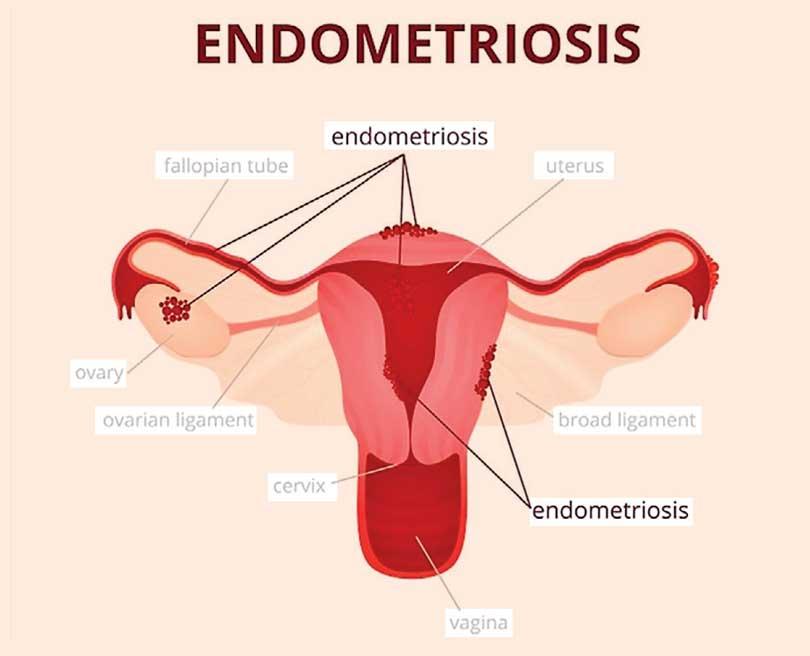Reply To:
Name - Reply Comment

Panel of experts at the discussion
 Endometriosis is a gynaecological condition prevalent among women of childbearing ages. 5-10% of women are affected by Endometriosis globally. However due to lack of knowledge and awareness concerning this condition, many women remain undiagnosed and suffer in silence. The disease is notoriously under-diagnosed and tends to progress even further in the absence of medical intervention. The delay in diagnosing this condition is due to the delay in decision making among affected women to seek medical attention. Thus when the diagnosis is finally made, the outcomes are often less than ideal due to the progression of the disease, and require elaborate treatment plans.
Endometriosis is a gynaecological condition prevalent among women of childbearing ages. 5-10% of women are affected by Endometriosis globally. However due to lack of knowledge and awareness concerning this condition, many women remain undiagnosed and suffer in silence. The disease is notoriously under-diagnosed and tends to progress even further in the absence of medical intervention. The delay in diagnosing this condition is due to the delay in decision making among affected women to seek medical attention. Thus when the diagnosis is finally made, the outcomes are often less than ideal due to the progression of the disease, and require elaborate treatment plans.
Most women with endometriosis experience severe pains during their menstrual period but unfortunately the notion that menstrual pain is something that is normal and has to be tolerated, has silenced the suffering of many women.The existing stigma concerning the menstrual cycle and gynaecological health prevents women from talking out loud about such issues and even guilts them into believing that they are being excessively fussy about normal female phenomena. As pain is an entirely subjective sensation and the severity of menstrual cramps differs woman to woman, there is no standard yardstick that can be used to compare and measure discomfort. However, any pain, that seems to be intolerable to the said individual, demands medical attention at its earliest.
As Endometriosis is a relatively common condition that could be better managed and contained when diagnosed early, it is of utmost importance to raise awareness about this condition among the general public. Thus, the Sri Lanka Endometriosis Association, an organization comprising of medical professionals who are committed to combating this condition by raising awareness among the general public, headed by Professor Hemantha Senanayake has declared the month of August as the month of Endometriosis awareness, and a series of discussions, forums and awareness building exercises are to be conducted during this month.
Pain killers largely alleviate the discomfort in patient, where as combined oral contraceptive pills are used to regulate the menstrual cycle and to control the Oestrogen levels
 At the inauguration event held at De Soysa Hospital for Women recently, Professor Senanayake implored medical professionals and media to take the awareness messages to the grassroot levels. He further explained how relatively common endometriosis is becoming. Endometriosis pains are not uncommon among school girls who are compelled to stay in the school sickroom on the said days. Menstruation being a monthly occurrence, women with endometriosis are compelled to suffer every month, for several days. Menstrual cramps due to endometriosis is why a number of women have to stay home from work, incurring losses of pays. When women are affected, it affects the society as a whole in many levels. Adequate knowledge and awareness would prompt such women to seek medical advice so that they will not have to suffer undue pain and will be spared form future complications. He also emphasized the importance of timely diagnosis and the difference it could make in treatment outcomes. Dr. Madura Jayawardena spoke about the psychological burden and the psychosocial aspects of endometriosis where as Dr. Probodhana Ranaweera and Dr. Mohommed Rishard illustrated the association of endometriosis with inferility anf family planning and about the importance of a well planned treatment regimen, individually catered to each patient.
At the inauguration event held at De Soysa Hospital for Women recently, Professor Senanayake implored medical professionals and media to take the awareness messages to the grassroot levels. He further explained how relatively common endometriosis is becoming. Endometriosis pains are not uncommon among school girls who are compelled to stay in the school sickroom on the said days. Menstruation being a monthly occurrence, women with endometriosis are compelled to suffer every month, for several days. Menstrual cramps due to endometriosis is why a number of women have to stay home from work, incurring losses of pays. When women are affected, it affects the society as a whole in many levels. Adequate knowledge and awareness would prompt such women to seek medical advice so that they will not have to suffer undue pain and will be spared form future complications. He also emphasized the importance of timely diagnosis and the difference it could make in treatment outcomes. Dr. Madura Jayawardena spoke about the psychological burden and the psychosocial aspects of endometriosis where as Dr. Probodhana Ranaweera and Dr. Mohommed Rishard illustrated the association of endometriosis with inferility anf family planning and about the importance of a well planned treatment regimen, individually catered to each patient.
The term endometriosis stems from the word endometrium, which signifies the inner surface of the uterus (womb). In some individuals, these endometrial cells get deposited outside the inner layer of the womb and take root in other areas, such as the ovaries, the Fallopian tubes and the lining of the pelvis. In other words, the endometrial cells get implanted and begin to grow in places where they are not supposed to. Upon puberty, the uterine endometrium gradually thickens throughout the menstrual cycle, anticipating pregnancy and if the woman remains not pregnant by the end of the menstrual cycle, the endometrial layer sloughs off, and exits the body as menses and the new cycle begins.
In women who suffer from Endometriosis, the endometrial cells that are implanted elsewhere also begin to slough off and bleed, but unlike cells in the womb itself, they have no outlet and this results in abnormal accumulations. This causes severe pain, formation of cysts and possible adhesions. The urinary tract and the anal areas have been noted to be involved in some cases as well. These patients experience symptoms such as painful urination, frequency and/or painful defaecation, especially during menstruation. If the nerves are involved, patients may experience backaches, thigh pains and lower abdominal pains, depending on the group of nerves involved. Interestingly, there are some asymptomatic patients who may not experience any of the above symptoms yet are victims of endometriosis. These patients find out incidentally, if and when they seek medical consultation about an unrelated problem and some remain unaware for the rest of their lives. However the main features of the endometriosis are infertility, pain during menstruation and pain during sexual intercourse. In some women the menstrual pain becomes progressively more severe over the years. The increase in pain intensity is another significant symptom that points towards endometriosis.
Dr. Chandana Jayasundara explained the pharmacological solutions involved in treating and controlling endometriosis. Pain killers largely alleviate the discomfort in patient, where as combined oral contraceptive pills are used to regulate the menstrual cycle and to control the Oestrogen levels. Progesterone pills and injections are used as well, as the hormone Progesterone opposes the less desirable effects of Oestrogen. Alternatives such as drug eluting intra uterine devices are also available he said, and depending on factors such as the extent of the disease, age of the patient and whether or not the patient is planning to become pregnant, appropriate management would be catered.

Dr. Dammike Silva described the surgical management aspect of Endometriosis. Although surgery is reserved for women who fail to respond to medical treatments, women wishing to get pregnant and for women with blood cysts, the preferred approach seems to be laparoscopic surgery. Dr. Dammike Silva also emphasized the importance of a multi disciplinary approach in the surgical management of endometriosis. A team comprising of a gynaecologist, an anesthetist and/or for pain management specialist, nurses, a radiologist specialized in gynaecological illnesses, a surgeon and a urologist, is of utmost importance to ensure optimum outcome following surgery. Such multi disciplinary care and approach has been made possible at the endometriosis center established at the Colombo South Teaching Hospital - Kalubowila.
Endometriosis causes debliating pain during the menstrual cycle, which most women accept and learn to live with. This causes a significant decrease in the quality of lives of the said women, as well as their families and ultimately the society
Chocolate cysts- the cysts found in endometriosis, are named aptly so due to the colour of the accumulated blood found within. Such cysts and endometriotic tissues have to be evacuated with great care during surgery, ensuring minimal or no damage to the surrounding vital organs such as the ureters, urinary bladder, parts of the intestines and nerves. This is a time consuming process, as the endometriotic tissue can be distributed in a random and sporadic fashion and may reside in complex locations. The earlier the diagnosis, the simpler the treatment and better the outcomes.
Endometriosis causes debilitating pain during the menstrual cycle, which most women accept and learn to live with. This causes a significant decrease in the quality of lives of the said women, as well as their families and ultimately the society. Early diagnosis is ultimately the key for successful management and containment of endometriosis. Hence this August, with the dawn of the inaugural endometriosis awareness month in Sri Lanka, may the silence and the stigma be broken, and the first step towards combating endometriosis is to talk out loud about it.